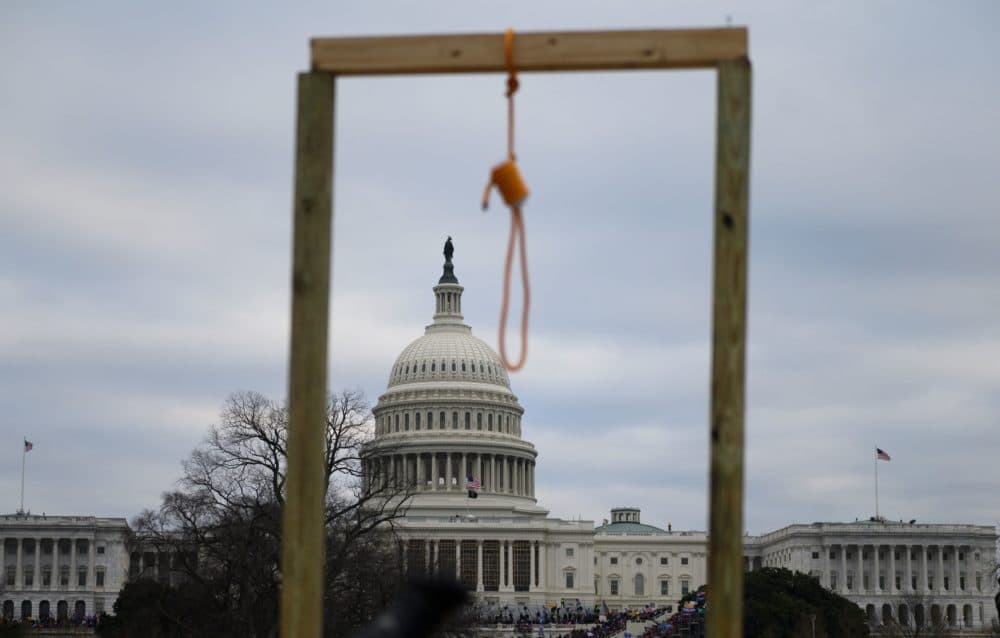Advertisement
How To Combat Anti-Democratic Movements In America And Beyond
Resume
Four years ago, WBUR's Radio Boston spoke with Yale philosophy professor Jason Stanley about the authoritarian threats he perceived to our democratic republic just after President Trump was sworn into office.
"It's popular to show that you have dominance over the truth.That's what an authoritarian does," Stanley said in 2017, just two weeks after Trump's inauguration. "So the media kept on waiting for him to be punished for that. But his supporters are attracted by that. The supporters are attracted by his open defiance of reality."
Since then, we've seen numerous deliberate falsehoods from the White House. And we saw the Unite the Right rally in Charlottesville, the 2019 Straight Pride parade here in Boston and the Jan. 6 violent pro-Trump insurrection at the U.S. Capitol.
In the waning hours of the Trump administration, Radio Boston checked in with Stanley, the author of a number of books including "How Propaganda Works" and "How Fascism Works," about how those authoritarian tendencies he detected played out over the Trump's four years in office.
Interview Highlights
Jason Stanley: "If you think about what we've normalized, it's shocking in retrospect. I mean, that interview four years ago was before the Muslim travel ban went through the Supreme Court. It was before the child separations. And it was before the horrific, narrowly politicized response to [COVID-19], when the president and his entire administration said, 'We don't care because it's affecting Democratic-run states. And so it's not our problem.' And then on top of it, culminated by what happened on Jan. 6 and the post-election fiascos where the president tried to annul the results of a free and fair election."
On whether the groundwork for authoritarianism remains in place:
Stanley: "The devaluing of the elite classes, the failures by the Democrats and the Republicans to to address America's problems, the yawning inequalities ... allowed someone like Trump to come and say, 'They've ignored you. The system is rigged and corrupt.' ...
"If we do that again, if too many Americans become convinced that the government is in the hands of wealthy elites — which, of course, it is to some extent — unless we address that, then we open ourselves up to this again.
"And of course, unless we address our horrific racial problem with racial injustice, where under Democratic presidents, Republican presidents, no matter what the administration, Black Americans are rightly protesting brutal treatment by a militarized police, that enables demagogs to come and say, 'I am your law and order president who will take care of the problem.' From from Nixon to Trump they have done that. So unless we deal with these terrible inequities, racial and economic, we're going to go through this again."
On the creep of authoritarianism around the world:
Stanley: "It's really vital to see how badly the brand of democracy has been harmed by the developments in the United States, I mean, Trump's allies and friends, [Turkish President Recep Tayyip] Erdoğan, [Brazilian President Jair] Bolsonaro — Bolsonaro said the other day that that it's up to the military to decide whether Brazil is going to be a democracy or a dictatorship. He's leaving it up to the military. So, I mean, he's being very open, the Trump of the tropics, as he's called. And he imitated Trump's response on COVID, resulting in the second highest death toll in the world behind the United States.
"So Trump's open anti-democratic antics have correlated with a far right international movement. And this was enabled, to some extent, by a failure to sort of crack down on this with, say, [Narendra] Modi in India, the the prime minister of India, who [former President] Obama was not harsh enough with. Who's also an authoritarian ethno-nationalist, religious nationalist. So we have these these movements all across the world."
On the factor racism has played in American Democracy:
Stanley: "The United States has always, of course, been hypocritical about its democracy. I mean, we've only been a real democracy since the 1960s ..."
Radio Boston host Tiziana Dearing: "What makes you say that?"
Stanley: "Well, black Americans were not allowed to vote until the 1960s in the South. And so you're not a democracy if a huge part of your population is not allowed access to the ballot. We were a Herrenvolk democracy, a democracy that constrains the vote to certain populations."
Dearing: "And do you feel we've overcome that today?"
Stanley: "Well, I think that Black Americans have pushed us to be more and more democratic from the civil rights movement to what we saw in Georgia with Stacey Abrams and others registering so many voters.
"We have an enormous movement that became explicit to disenfranchise black voters. That's what the president was talking about when he blamed his loss on Detroit, Atlanta, Philadelphia, Milwaukee — you know, cities with large Black or majority Black populations. So so there's a push within the Republican Party that has become explicit."
On how the Republican Party can rid itself of Trumpian tendencies:
Stanley: "I want a Republican Party and I want a conservative movement that repudiates those anti-democratic tendencies. We're so much better as a country when we all commit, despite our differences, to negotiating together and allowing everyone to have a voice. And unfortunately, where we have this incredibly strong anti-democratic movement that's laced through with the idea that Black voters are not legitimate voters. And that concerns me."
On how we can move forward constructively:
Stanley: "I think we can try to get over these divisions, we can try to recognize that we have a lot of work as a country to do and we do not want to get in the situation where we view our political opponents as as mortal threats and danger. And there's going to be social conservatives. There's going to be liberals, progressives, and we all should commit to every one of us having a democratic voice and to working together to try to address collectively the problems we face, which are COVID, inequality and racial injustice, among others.
This segment aired on January 19, 2021.

